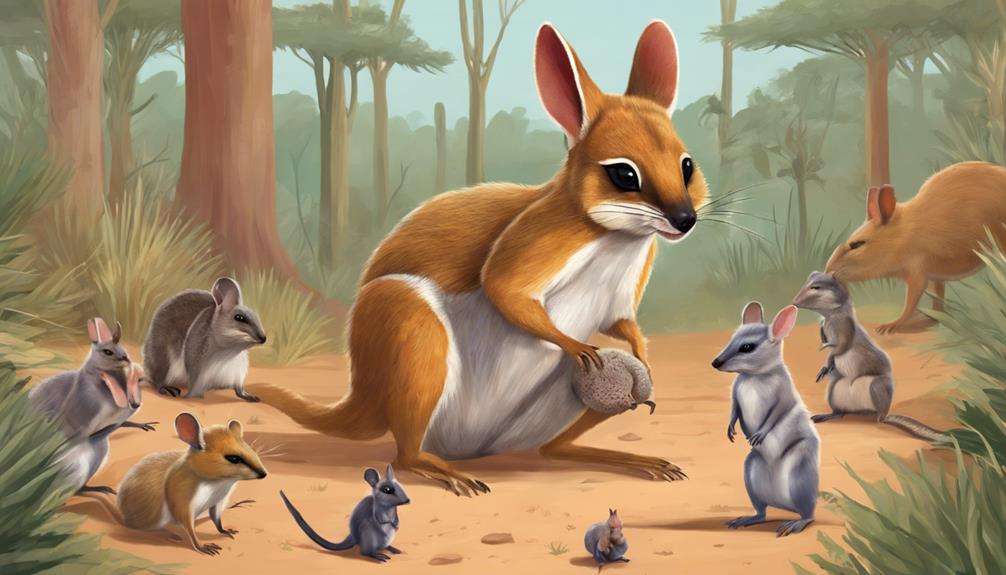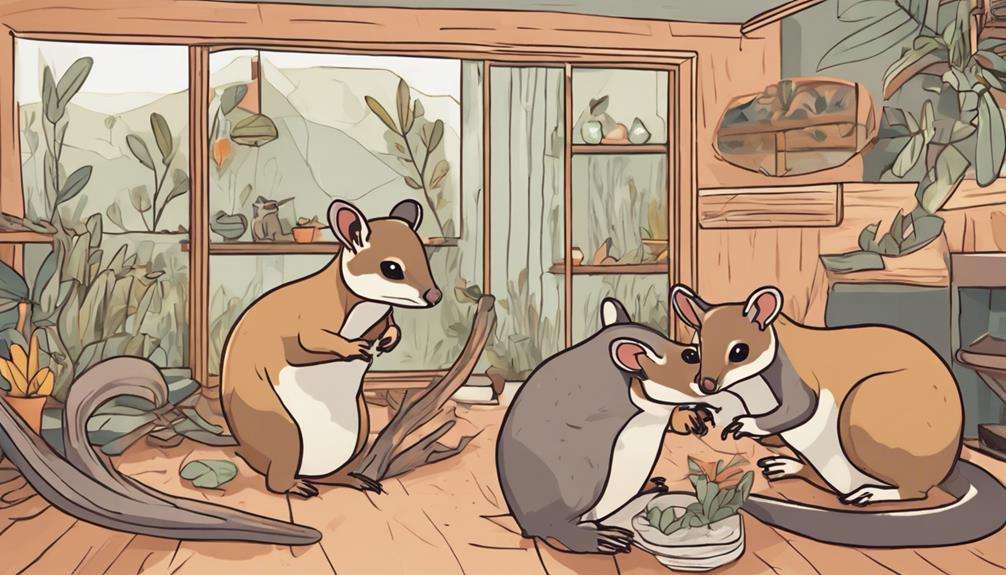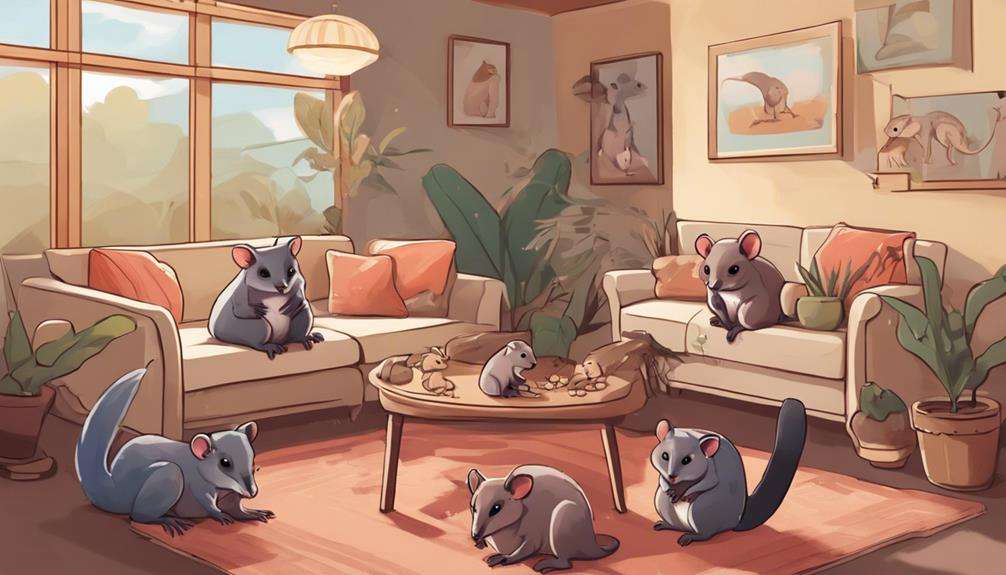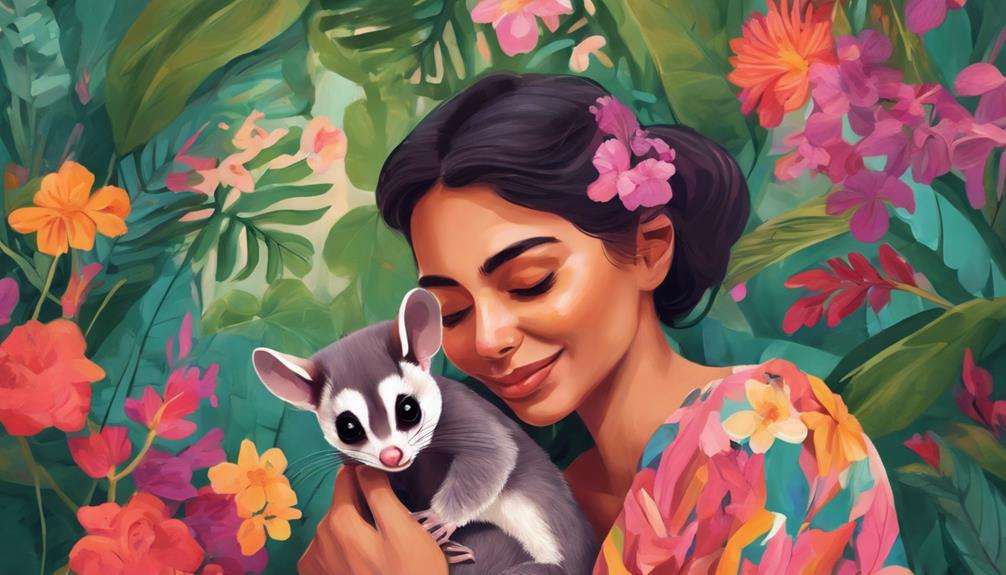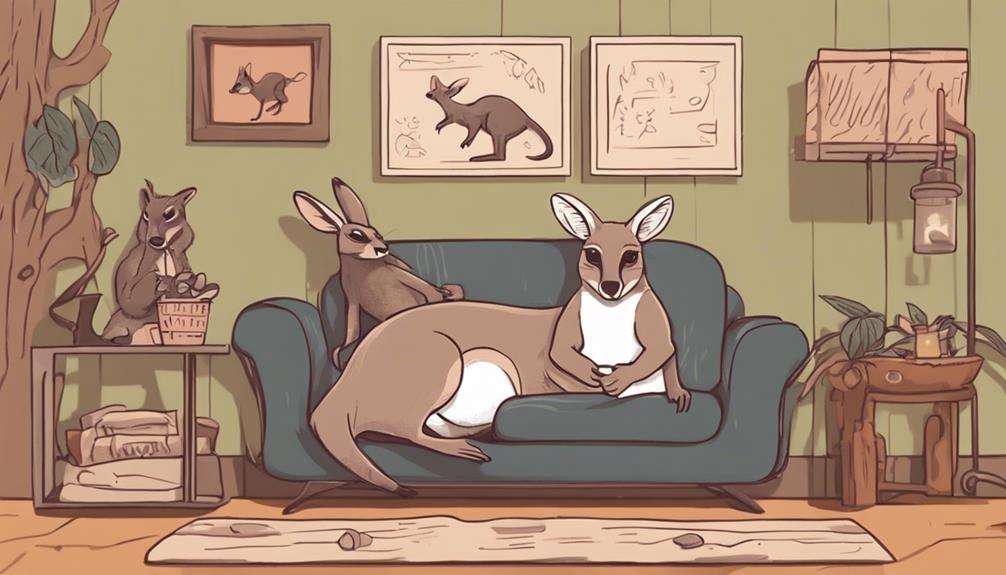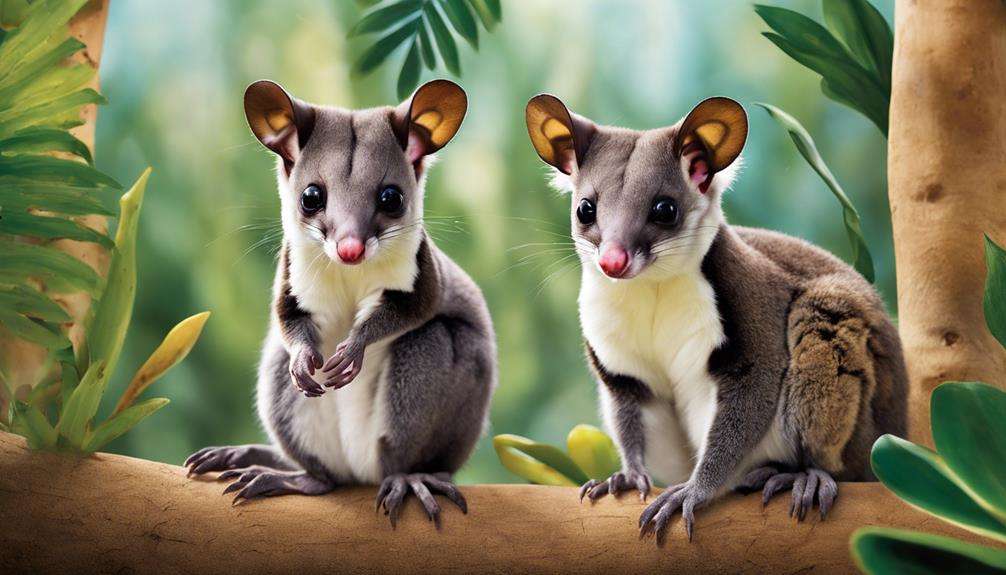To successfully care for marsupials as house pets, follow these 10 tips that will help you navigate the nuances of their unique needs and behaviors.
From selecting the right marsupial companion to ensuring their health and happiness, each tip plays a pivotal role in creating a harmonious environment for these special creatures.
Ready to embark on this marsupial journey? Let's explore the first step together.
Key Takeaways
- Consider size, behavior, and care needs before choosing a marsupial pet.
- Provide pouch-like environments and mental stimulation for their well-being.
- Understand social dynamics and communication to ensure proper care.
- Monitor health, bond through interaction, and use positive reinforcement for training.
Choosing the Right Marsupial Pet
When selecting a marsupial as a house pet, it's crucial to carefully consider factors such as size, behavior, and specific care requirements. Marsupials are exotic pets that require a tailored diet to meet their nutritional needs. It's essential to research and understand the proper diet for the specific species you're interested in. Additionally, before bringing a marsupial home, it's important to be aware of any legal restrictions and obtain the necessary permits as some species may be protected or regulated in certain areas.
Social interaction is another critical aspect to consider when choosing a marsupial pet. These animals often require companionship and mental stimulation to thrive in a household setting. Ensuring that you can provide the necessary social interactions for your marsupial is vital for their overall well-being and happiness. By taking the time to understand the specific care requirements, legal considerations, and social needs of the marsupial species you're interested in, you can make an informed decision when selecting the right marsupial pet for your home.
Understanding Marsupial Behavior
When observing marsupials in captivity, you may notice their unique habits such as pouch development for offspring.
Understanding the social interactions among marsupials can provide insights into their specific hierarchies within groups.
Reproduction behaviors of marsupials, including mating rituals and care for young, are essential aspects to grasp for proper care and enrichment in a domestic setting.
Marsupial Habits in Captivity
Understanding the behavior of marsupials in captivity involves recognizing their unique instincts and developmental needs, particularly their preference for pouch-like environments.
Marsupials have a strong instinct to seek out pouch-like spaces for comfort and security, even in the absence of an actual pouch. Failure to provide such environments can lead to stress-related behaviors in captive marsupials.
To mitigate this, it's crucial to offer enrichment activities that simulate their natural behaviors. These activities can include providing climbing structures, hiding spots, and foraging opportunities to keep them mentally and physically engaged.
Social Interactions Among Marsupials
Social interactions among marsupials reveal intricate patterns of communication, bonding, and social structures essential for their well-being and survival in captivity.
- Marsupials like sugar gliders are social animals that thrive in groups, requiring regular human interaction for bonding.
- Communication among marsupials involves vocalizations, grooming, and play behaviors to establish and maintain relationships.
- Colony dynamics within marsupial groups display hierarchy and cooperation, crucial for their survival.
Understanding these behaviors is vital for maintaining the mental stimulation and overall health of marsupials in captivity. By observing and engaging in their social interactions, one can gain valuable insights into their well-being and ensure they thrive in a domestic setting.
Reproduction Behaviors of Marsupials
Observing the intricate reproductive behaviors of marsupials unveils a fascinating adaptation linked to their unique pouch development. Female marsupials, including sugar gliders, possess a bifurcated reproductive system with multiple vaginas and uteruses. This anatomical feature allows for the birth of extremely underdeveloped young, known as joeys, which further mature in the safety of the mother's pouch.
Some marsupials, such as kangaroos, can exhibit diapause, delaying birth until environmental conditions improve. The pouch plays a vital role in providing warmth, nourishment, and protection for the developing young. Understanding these reproductive behaviors sheds light on the remarkable evolutionary strategies that marsupials have developed to ensure the survival of their offspring.
Marsupial Diet and Nutrition
Marsupials exhibit diverse dietary preferences, ranging from herbivorous to insectivorous, necessitating a carefully balanced nutrition plan for optimal health. When considering the diet of small animals like sugar gliders, it's essential to provide the right balance of nutrients to support their well-being.
Here are key points to keep in mind for proper nutrition:
- Sugar gliders are insectivores, requiring a diet rich in nectar, pollen, and insects for protein.
- In addition to insects, sugar gliders need a variety of fruits and vegetables to meet their nutritional needs adequately.
- Occasional small animals can be included in their diet to ensure they receive the necessary nutrients for their overall health.
Creating a Comfortable Habitat
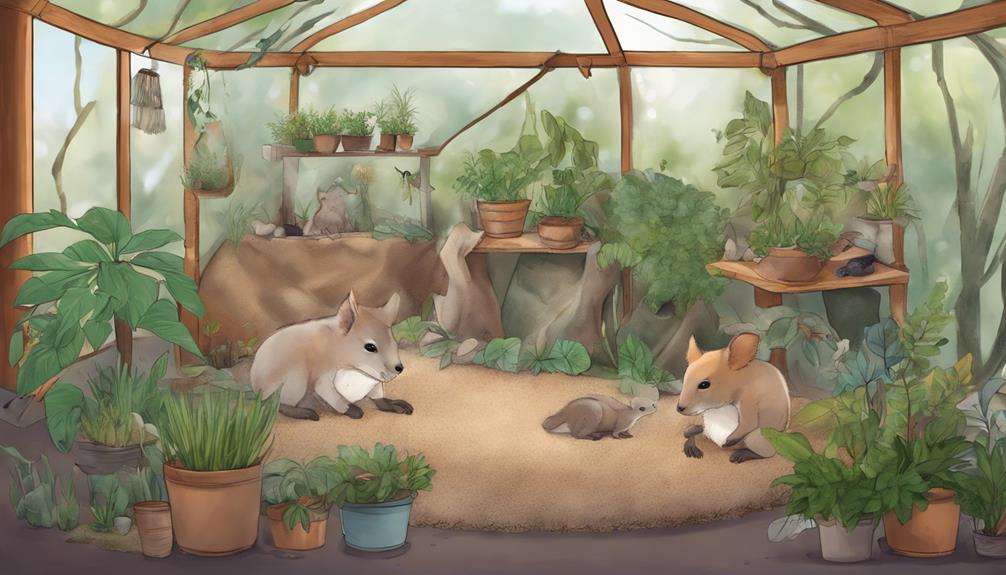
To create a comfortable habitat for your marsupial, focus on providing proper bedding materials like soft fleece or shredded paper for warmth and coziness.
Ensure there are adequate hiding spots where your pet can retreat to when feeling stressed or tired.
Offer climbing opportunities with structures that mimic their natural environment to encourage physical activity and mental stimulation.
Proper Bedding Materials
When creating a comfortable habitat for your marsupial, it's essential to select soft, clean materials such as fleece, cotton, or paper bedding to ensure their well-being and comfort. Proper bedding materials play a crucial role in providing a cozy environment for your pet.
Here are some key points to consider:
- Choose materials that are gentle on your marsupial's skin.
- Avoid using any bedding that may pose a risk if ingested.
- Provide nesting materials like shredded paper or untreated wood shavings for natural burrowing behaviors.
Adequate Hiding Spots
Ensuring adequate hiding spots in the habitat of pet marsupials is crucial for their well-being and comfort, providing them with retreat options for when they feel stressed or tired. To create a comfortable environment, provide nesting boxes, pouches, or cozy corners where they can seek refuge.
Incorporate various hiding spots such as tunnels, branches, or artificial foliage to mimic their natural habitat. It's essential that these hiding spots are secure, stable, and easily accessible to help marsupials feel safe. Using natural materials like wood, bark, or leaves can enhance their sense of familiarity and comfort.
Rotating and changing hiding spots regularly will prevent boredom and promote mental stimulation, encouraging exploration and a healthy environment for your pet marsupial.
Climbing Opportunities
Creating a comfortable habitat for pet marsupials involves providing ample climbing opportunities to mimic their natural behavior. Arboreal animals like sugar gliders require vertical space to thrive in captivity. To ensure their well-being, incorporate climbing structures such as branches, ropes, ladders, and climbing equipment in their habitat. These structures not only serve as exercise tools but also offer mental stimulation for the marsupials.
Health and Wellness for Marsupials
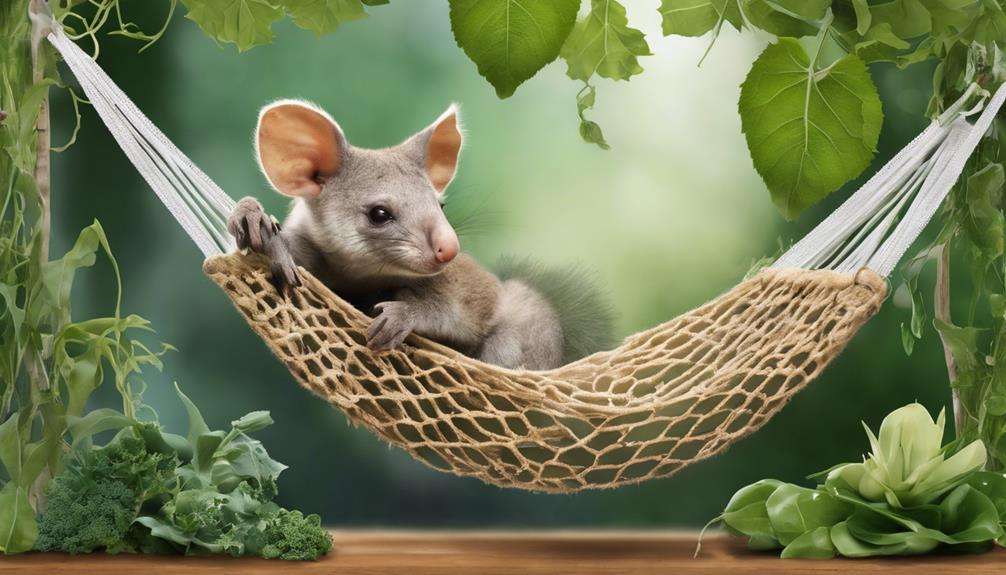
Maintaining the health and wellness of marsupials requires regular veterinary check-ups. Marsupials, like any other pets, need routine examinations to detect any potential health issues early on.
Alongside veterinary care, providing a well-rounded diet is crucial for their overall well-being. Marsupials should be fed a mix of fruits, vegetables, and protein sources to meet their dietary needs adequately. Understanding the specific habitat and environmental requirements of marsupials is also vital in ensuring their health. By creating a living space that mimics their natural habitat, you can promote their physical and mental wellness.
Monitoring your marsupial for any signs of stress, illness, or injury is essential for prompt intervention. Being observant of changes in behavior or appetite can help you catch health problems early. Additionally, maintaining cleanliness in their living area and implementing proper hygiene practices are essential in preventing health issues in marsupials.
Bonding and Socializing With Your Marsupial
To foster a strong bond with your marsupial, regular interaction and playtime are essential. Understanding their body language and vocalizations will help you interpret their social cues and strengthen your relationship.
Socializing your marsupial with other household members can prevent stress and promote a well-adjusted and sociable pet.
Marsupial Socialization Tips
Regular social interaction with your marsupial, such as handling, playtime, and talking, is vital for fostering a strong bond and promoting their well-being. Engaging with your marsupial regularly can lead to various benefits:
- Bonding: Spending quality time with your marsupial helps strengthen the bond between you.
- Stress Reduction: Socializing with your marsupial can reduce their stress levels and improve their overall well-being.
- Behavior Prevention: Proper socialization can prevent behavioral issues in marsupials, ensuring a healthy relationship between you and your pet.
Remember to consider your marsupial's unique personality and preferences when socializing to create a positive experience for both of you.
Building Trust With Marsupials
When seeking to build trust with your marsupial, focus on gradual exposure and positive reinforcement to foster a strong bond and meaningful interactions.
Spend quality time near your marsupial to allow them to become familiar with your presence. Use positive reinforcement techniques such as offering treats when they display desired behaviors to create a positive association with interactions.
It's crucial to respect your marsupial's boundaries and cues; this helps avoid stress or fear, building a foundation of trust.
Provide enriching activities like interactive play sessions or gentle grooming to strengthen your bond. Consistency and patience are key; over time, these efforts will help you establish a deep and trusting relationship with your marsupial.
Playtime for Marsupials
Ensuring adequate playtime for your marsupial is essential for fostering bonding and socialization. Regular interaction with your marsupial through play offers numerous benefits:
- Mental Stimulation: Playtime helps keep marsupials, such as sugar gliders, mentally engaged, preventing boredom and potential behavioral issues.
- Enhanced Bonding: Interactive toys, climbing structures, and bonding pouches can enhance the playtime experience, strengthening the bond between you and your marsupial.
- Trust Building: Engaging in play activities with your marsupial, offering treats, gentle handling, and positive reinforcement, helps them feel safe and secure in their environment.
Training Tips for Marsupial Pets
To effectively train your marsupial pet, utilize positive reinforcement techniques to encourage desired behaviors such as using treats and clicker training. Positive reinforcement involves rewarding your marsupial with treats like mealworms or small fruits immediately after they exhibit the desired behavior.
Consistent short training sessions are essential for teaching marsupials new commands and tricks effectively. Marsupials, particularly sugar gliders, respond well to clicker training, where the click sound serves as a signal for a job well done, followed by a treat. This association helps them understand which behaviors lead to rewards, speeding up the learning process.
Handling and Grooming Marsupials
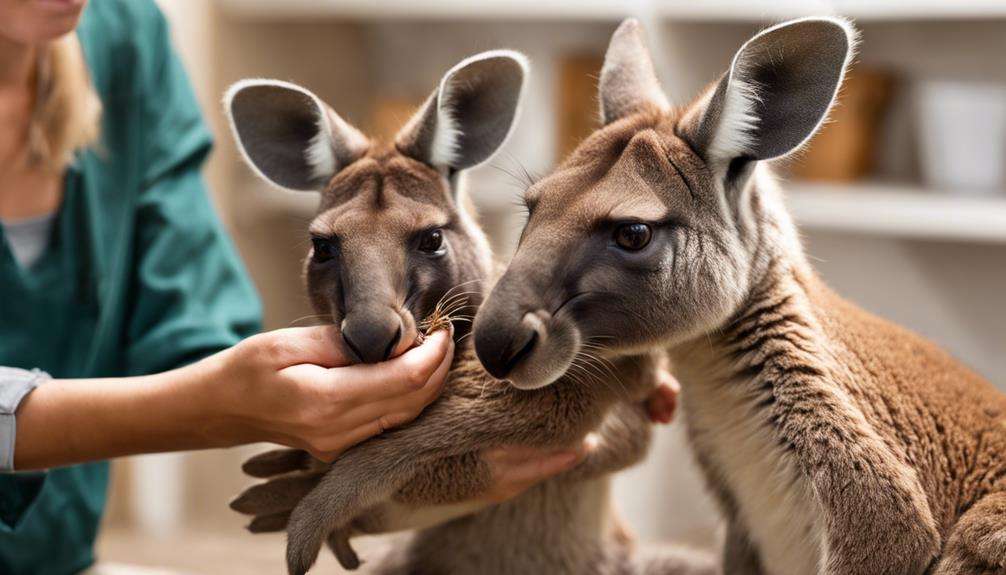
For optimal health and well-being of marsupials like sugar gliders, gentle handling and proper grooming practices are essential. When it comes to handling and grooming your marsupial pet, here are some crucial tips to keep in mind:
- Handle with Care: Marsupials, such as sugar gliders, are sensitive creatures that require delicate handling to avoid stress and injuries. Always approach them calmly and support their bodies securely to prevent any mishaps.
- Grooming Rituals: Some marsupials, like sugar gliders, benefit from dust baths to maintain their fur health. Regular grooming sessions are crucial for inspecting your pet for injuries, parasites, or any signs of health issues. Brushing their coat gently can help prevent matting and ensure their fur remains in top condition.
- Patience is Key: Handling and grooming sessions should be conducted patiently and calmly to build trust with your marsupial companion. Rushing through these tasks can cause distress and hinder the bond between you and your pet.
Marsupial Enrichment and Entertainment
When enriching and entertaining your marsupial companion, it's vital to provide a diverse range of stimulating toys and activities to promote their mental and physical well-being. Marsupials thrive on enrichment items that mimic their natural habitat and encourage their innate behaviors. Consider incorporating climbing structures, such as branches or shelves, to encourage physical activity and provide them with elevated spaces to explore. Toys like tunnels and puzzle feeders can engage their minds, promoting problem-solving skills and preventing boredom. Rotating these toys regularly can maintain their interest and stimulate curiosity.
Hanging pouches and hammocks offer cozy resting spots while mimicking the pouch environment they're accustomed to. Foraging opportunities are essential for marsupials, so hide treats or food items in different areas of their enclosure to encourage natural behaviors like scavenging. Introducing novel scents or sounds can also keep them engaged and curious in their environment. By providing a variety of toys, climbing structures, foraging opportunities, and enrichment items, you can ensure a fulfilling and stimulating environment for your marsupial companion.
Legal Considerations for Keeping Marsupials

Considering the diverse legal landscape surrounding marsupial ownership, understanding the specific regulations in your locality is paramount to ensuring compliance and responsible pet ownership. When it comes to keeping marsupials as house pets, there are several key legal considerations to keep in mind:
- Exotic Pet Ownership Laws: Laws regarding the ownership of exotic pets, including marsupials, can vary significantly from one place to another. Familiarize yourself with the exotic pet ownership laws in your area to avoid any legal complications.
- Marsupial Ownership Regulations: Some states or countries may have specific regulations governing the ownership of marsupials. Make sure to research and adhere to these regulations to stay on the right side of the law.
- Permits and Licenses: In certain regions, owning a marsupial may require obtaining permits or licenses. Ensure you have the necessary paperwork in place before bringing a marsupial into your home.
Working with reputable breeders can also help ensure that the marsupial you acquire has been obtained legally and ethically. By being informed and following the proper procedures, you can enjoy the companionship of a marsupial while staying in compliance with the law.
Frequently Asked Questions
Can You Have a Marsupial as a Pet?
Yes, you can have a marsupial as a pet. Legal requirements, suitable habitats, bonding process, and nutritional needs must be considered. Ensure permits, appropriate socialization, nocturnal understanding, and a diet rich in fruits, vegetables, and protein.
Are There Any Domesticated Marsupials?
Domesticated marsupials are rare. Their natural behaviors, like pouch-rearing, make complete domestication challenging. Sugar gliders are among the few adapted to captivity, but they still exhibit wild instincts. Proper care and suitable habitats are crucial for their well-being.
What Is the Best Marsupial Pet?
Sugar gliders are often considered the best marsupial pets due to their small size, sociable nature, and intelligence. They bond strongly with caregivers, requiring social interaction. Proper care includes a balanced diet, suitable housing, and regular vet visits.
What Are the Pros and Cons of Owning a Sugar Glider?
Owning a sugar glider offers bonding benefits with its social behavior, but it demands meticulous care requirements like meeting dietary needs. Health considerations are vital due to their lifespan. Consider the commitment for a fulfilling relationship.
Conclusion
In conclusion, remember to prioritize the proper care and attention needed when keeping marsupials as house pets.
Ensure their diet, habitat, and social needs are met to maintain their health and happiness.
Incorporate enrichment activities and regular veterinary check-ups to promote their well-being.
By following these tips and staying informed about legal considerations, you can enjoy a fulfilling relationship with your marsupial companion.
Remember, responsible ownership results in rewarding relationships.

